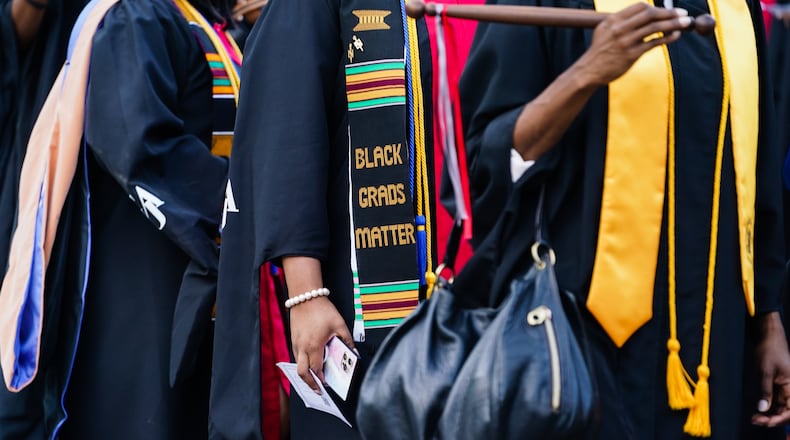To mark HBCU Week, The Atlanta Journal-Constitution is running a series of guest columns that examine the role of historically Black colleges and universities and the challenges that face them. The White House is hosting the 2023 National HBCU Week Conference in Arlington, Virginia, this week with the theme of “Raising the Bar: Forging Excellence through Innovation & Leadership.” The AJC guest columns will also speak to those themes.
Today, Clark Atlanta University President George T. French Jr. highlights the role of HBCUs in educating Black leaders, teachers and innovators. Here are links to three guest columns that have already appeared: Harry Williams of the Thurgood Marshall College Fund, David A. Thomas, Morehouse president, and Spelman Provost Pamela Scott-Johnson. Return to this space for more perspectives on HBCUs.
By George T. French Jr.
The recent decision by the U.S. Supreme Court to strike down affirmative action in higher education admissions decisions is deeply disappointing, as it has the potential to hinder African Americans from access to significant educational opportunities. However, amidst this setback, it is crucial to recognize the prospectively unintended consequence of this ruling.
Historically Black colleges and universities now have a unique opportunity to showcase their contributions to the economy and value in providing education to the best and brightest. A study by the United Negro College Fund and the Thurgood Marshall College Fund found that HBCUs generate $14.8 billion in economic impact annually. This statistic is just one quantitative validation of HBCUs’ long-standing history of excellence in nurturing African American students and contributing to the advancement of our society through economic empowerment, innovation and proven results.
Credit: Steve Schaefer
Credit: Steve Schaefer
Supporting HBCUs: A Path to Empowerment
Addressing the financial disparities faced by HBCUs is crucial for their upliftment. One potential solution lies in establishing a dedicated federal funding program specifically designed to bolster HBCUs. This program could provide sustained financial assistance, investing in infrastructure development, faculty recruitment and retention, curriculum enhancement and student scholarships. By prioritizing HBCUs in federal funding, we can bridge the financial gap and enable these institutions to provide an even more enriching educational experience that ultimately leads to improved macro-socioeconomics.
The Neglected Issue: Insufficient Support for Research and Innovation
Despite their commitment to providing quality education, HBCUs lack adequate support for research and innovation. Many struggle to secure funding for research initiatives, limiting their contribution to scientific advancements and technological breakthroughs. Yet, despite this disparity, HBCUs play a significant role in producing graduates in science, technology, engineering, and mathematics fields. A study conducted by the National Science Foundation found HBCUs award a disproportionately high number of bachelor’s degrees to African American students in these fields.
In fact, HBCUs produce 27% of all African American graduates in STEM disciplines. This fact should encourage the philanthropic community and government bodies to collaborate to establish specialized grant programs that encourage and support more advanced research at HBCUs. By fostering a culture of innovation, we can empower the next generation of African American scholars and scientists to make groundbreaking discoveries.
The Importance of Supporting HBCUs Now
Supporting HBCUs is not only an act of social justice, but also an investment in our collective future. In fact, HBCUs foster entrepreneurship and job creation. According to a report by the Association for the Study of African American Life and History, HBCUs produce more than 50% of African American professionals and public school teachers, and 70% of African American dentists and physicians.
By supporting these institutions, we ensure the intellectual and cultural contributions of African Americans are celebrated and recognized, building a stronger and more harmonious society. Throughout history, HBCUs have served as catalysts for social change, producing leaders who challenge systemic racism and fight for equality. In our current quest for a more inclusive society, HBCUs continue to play a pivotal role in promoting diversity, equity and justice.
Furthermore, HBCUs provide a unique educational experience that nurtures the growth and development of their students. These institutions offer an environment where students can thrive academically, socially and culturally, free from the burden of racial prejudice. By supporting HBCUs, we not only empower current students but also inspire future generations to pursue higher education, breaking the cycle of inequality and expanding opportunities for all.
As we navigate the challenges of our time, it is essential to recognize the invaluable role that HBCUs play in our society. By establishing dedicated federal funding programs, prioritizing research and innovation and supporting the growth and development of HBCUs, we can ensure their continued success and impact. Together, as a united community, we have the power to uplift HBCUs, empowering them to shape the minds of future leaders, promote inclusivity and drive transformative change.
Let us seize this moment and stand firmly in support of HBCUs for the betterment of our society and the generations to come.
About the Author
The Latest
Featured



